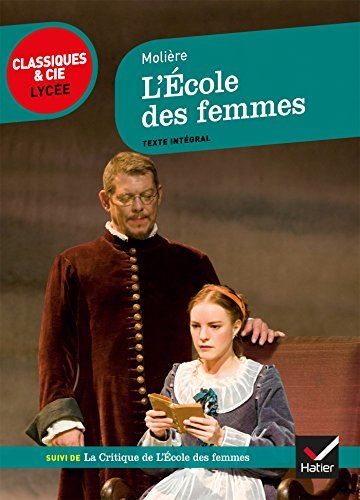
L’une des comédies les plus célèbres de Molière, suivi de La Critique de L’École des femmes . En complément, un cahier « Mises en scène », pour comparer différentes représentations de la pièce. L’École des femmes Arnolphe, un vieux barbon, a élevé dans la solitude et l'ignorance Agnès, sa pupille, en vue d'en faire une épouse dévouée. Mais l'amour sincère du jeune Horace va favoriser la métamorphose de l'ingénue. À travers cette « grande comédie », Molière défend le droit des femmes à s'émanciper de la tyrannie de l'autorité. La Critique de l’École des femmes Dans cette pièce écrite l’année suivante pour répondre à la querelle suscitée par L’École des femmes, Molière prône une sagesse alliant modération et plaisir. Le cahier « Mises en scène » Dans ce supplément, des photos, en couleurs, de trois mises en scène emblématiques de L’École des femmes, et différents outils d’analyse. Pour approfondir la connaissance de la pièce, à travers l’étude de sa représentation. Le dossier Avec toutes les ressources utiles au lycéen pour étudier l’œuvre : • un guide de lecture au fil du texte • des repères et des fiches sur l’œuvre • deux corpus thématiques : «Malentendus, méprises et quiproquos », « Le genre du sermon » • des sujets types pour l’écrit et l’oral du bac Et un guide pédagogique Sur www.classiques-et-cie.com. En accès gratuit réservé aux enseignants, il propose une séquence de cours sur l’œuvre et les corrigés des sujets de type bac.
Author

Jean-Baptiste Poquelin, also known by his stage name, Molière, was a French playwright and actor who is considered one of the greatest masters of comedy in Western literature. Among Molière's best-known dramas are Le Misanthrope, (The Misanthrope), L'Ecole des femmes (The School for Wives), Tartuffe ou l'Imposteur, (Tartuffe or the Hypocrite), L'Avare ou l'École du mensonge (The Miser), Le Malade imaginaire (The Imaginary Invalid), and Le Bourgeois Gentilhomme (The Bourgeois Gentleman). From a prosperous family and having studied at the Jesuit Clermont College (now Lycée Louis-le-Grand), Molière was well suited to begin a life in the theatre. Thirteen years as an itinerant actor helped to polish his comic abilities while he also began writing, combining Commedia dell'Arte elements with the more refined French comedy. Through the patronage of a few aristocrats including the brother of Louis XIV, Molière procured a command performance before the King at the Louvre. Performing a classic play by Pierre Corneille and a farce of his own, Le Docteur amoureux (The Doctor in Love), Molière was granted the use of Salle du Petit-Bourbon at the Louvre, a spacious room appointed for theatrical performances. Later, Molière was granted the use of the Palais-Royal. In both locations he found success among the Parisians with plays such as Les Précieuses ridicules (The Affected Ladies), L'École des maris (The School for Husbands) and L'École des femmes (The School for Wives). This royal favour brought a royal pension to his troupe and the title "Troupe du Roi" (The King's Troupe). Molière continued as the official author of court entertainments. Though he received the adulation of the court and Parisians, Molière's satires attracted criticisms from moralists and the Church. Tartuffe ou l'Imposteur (Tartuffe or the Hypocrite) and its attack on religious hypocrisy roundly received condemnations from the Church while Don Juan was banned from performance. Molière's hard work in so many theatrical capacities began to take its toll on his health and, by 1667, he was forced to take a break from the stage. In 1673, during a production of his final play, Le Malade imaginaire (The Imaginary Invalid), Molière, who suffered from pulmonary tuberculosis, was seized by a coughing fit and a haemorrhage while playing the hypochondriac Argan. He finished the performance but collapsed again soon after, and died a few hours later. In his time in Paris, Molière had completely reformed French comedy.